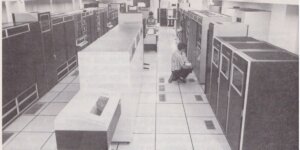
Photo Credits: Wenjie Dong/Getty Images and Adam Russell
“I believe in thinking hard about good problems,” said Adam Russell, the new AI Division Director at the Information Sciences Institute (ISI), a research institute of the USC Viterbi School of Engineering.
ISI was founded in 1972 “to solve the world’s most difficult technical problems.” Today, the most difficult problems facing computing fields, especially AI, aren’t necessarily technical; they range from ethical to existential. This might explain why Russell – a social anthropologist who obtained his D.Phil from the University of Oxford, where he was a Rhodes Scholar – is the right person for the job.
“In AI in particular there are hard problems and there are topical problems, and then there are the really important problems. And I think if we’re going to realize AI for good, tackling those important problems will be crucial. I look forward to working with the AI Division to help craft what those are and help support and make leaders of the members of the division, both as technical leaders and as thought leaders on these important problems,” said Russell.
ISI’s AI Division is one of the world’s largest AI research groups, with over 170 faculty, research staff and graduate students. The division conducts fundamental and applied research in all areas of AI, including machine learning, natural language, image and video processing, knowledge graphs, commonsense reasoning, data science, computational social science and AI fairness.
USC President Carol Folt said, “I had the opportunity to meet Adam Russell at the unveiling of USC’s Capital Campus in Washington D.C. this past spring, and I look forward to welcoming him to the Trojan family. His wide-ranging experience and big thinking are especially needed at this unprecedented time in artificial intelligence research. Adam brings expertise in human behavior, a strong background in government funding, and a breadth of experience across disciplines to help ensure ISI and USC are force multipliers in AI.”
Craig Knoblock, the Keston Executive Director of ISI, said of Russell: “We have the opportunity to influence the conversation that’s happening about AI. And I think Adam is a terrific person to do that. He is deeply concerned about the issues but optimistic that ISI can play a big role in influencing those discussions and help affect the future in terms of where AI is going.”
Applying Collective Intelligence to Artificial Intelligence
And where is AI going? Russell believes the answer to that lies in the collective.
In a lot of industries, and certainly in academic areas, there’s a focus on individuals and individual genius.
Russell said this type of thinking “doesn’t give credit to the important feature that ultimately is the success of our species: our ability to coordinate and cooperate.” He continued, “Where we win, is in our ability to build social networks and create what some have called a cultural brain.”
This is collective intelligence. And it is something Russell has worked on extensively, most recently at University of Maryland’s Applied Research Laboratory for Intelligence and Security (ARLIS), where he helped stand up its Center for Decision Advantage, focusing on the creation and use of “collective intelligence” capabilities to enable better decision-making processes under deep uncertainty.
“We collectively know more than any single individual among us; the really successful organizations in societies understand how to build that and tap that. And increasingly, our collectives are going to involve not just humans, but very smart machines.”
The question he asks is: “How do we leverage that and exploit it to the full advantage?”
Russell continued, “Hopefully I’ll be able to help tap that further, because none of us are smart enough to get us out of these problems that we’re facing. Most of our great advances have been made through collectives. And that will be increasingly true going forward. If I can help ISI continue on this path and make the impact I think it can, it will be because of the collective.”
Apocaloptimism About AI
In Russell’s eyes, one impact ISI’s AI Division can make will be in keeping AI safe. In fact, he said “it’s our role to be in that mix.”
He continued, “AI is clearly one of the more consequential technologies our species will have developed.” The term he uses to describe his feelings on it: Apocaloptimism. “It means, I’m extremely optimistic that there are profound opportunities, but we have to be aware of the risks. It’s the right term for me right now, because both extremes are there, and that’s what gives me the urgency to be in the discussion.”
He believes ISI has a role to play in this: “Part of it is to remain technically excellent, but also technically truthful. I think there are going to be new opportunities for ISI to lead the way.”
What kinds of opportunities? Russell said, “I’m a big fan of demonstrating things in the world as a way to change what people think is possible. There are opportunities at USC (and beyond) for ISI to provide those demonstrations and help people understand that there are ways to thread this needle.”
The Nuts and Bolts of Funding
Beyond the big picture thinking Russell brings to ISI, he also comes with extensive experience in government funding. After joining the government in 2009, he spent the next decade at the Intelligence Advanced Research Projects Activity (IARPA) and then the Defense Advanced Research Projects Agency (DARPA).
Knoblock said he is “thrilled that Adam has decided to join ISI. He has a tremendous amount of experience in the funding world, having served as a program manager for IARPA, a program manager for DARPA and then being involved in setting up ARPA-H. And that’s extremely beneficial for us, since so much of our research funding comes from those kinds of organizations.”
“He understands what goes on behind the scenes in funding academic research. And that knowledge is exactly what we need in order to succeed,” said Fred Morstatter. Morstatter, a research assistant professor of computer science at USC and research team leader in ISI’s AI Division, worked with Russell when he was a program manager at DARPA.
Advice, Advocacy and an Open, Curious Mind
Morstatter said that in addition to his knowledge of the funding world, “He [Russell] has a way of understanding the technical things we’re working on and how they apply to the bigger picture.” He continued, “The interdisciplinary lens that Adam has can help us find more opportunities. He looks at how you can apply your work or blend your work with something someone else is doing to have a larger impact.”
“He also advocates for what you’re doing. He’s a voice of support when you’re approaching these other agencies, and he’s very open minded about the range of solutions that might work for solving a particular problem.”
Emilio Ferrara, a professor of computer science at USC and research team leader at ISI’s AI Division, also previously worked with Russell. He said, “Adam has established himself with a career in research, looking at this direction of human behavior in an era of machines. He’s not the typical machine learning, NLP or AI person who has one hammer, and everything he sees is a nail. He understands that there are different kinds of problems, different types of approaches that work to get different types of solutions. When I worked with him, he never underestimated or oversimplified the complexity of problems that relate to modeling human behavior.”
Knoblock noted, “It’s exciting that Adam is from a different world. I think it’s really great to bring in people with a different perspective on things and different ideas. It helps us broaden our scope of research and bring in new ideas.”
On this, Russell himself said of his background, “Part of being an anthropologist is that you realize that essentially everything we believe is in some sense culturally constrained, and that there are other ways of thinking about things.”
Russell has spent his career trying to understand human nature, society and human behavior. Ferraro said, “Adam’s search to understand human behavior doesn’t end with building a machine learning model. He wants to dive deeper into an understanding of what those computational methods lead to, and what kind of understanding we gain from utilizing data, machine learning and AI to solve problems in the space of one behavior in society.”
Plans for the AI Division
As of today, July 10, 2023, Russell leads the AI Division. He will initially be working out of ISI Arlington, with regular visits to ISI’s Marina del Rey, CA and Boston, MA offices.
“I’ve been fortunate enough to have worked with ISI’s AI Division in the past – I actually funded them while I was at DARPA – and I’ve seen what they’re able to do. Technically, they’re incomparable in both the spread and also the depth of talent. I’m really excited to have a chance to work with them, in particular to take the entrepreneurial spirit that everybody at ISI has and help focus that energy on really important problems.”
As for his goals, Russell said, “I think purpose – knowing why we do what we do, and why it is important – is critical to any organization. So, a hallmark of success for me would be if people look back at their time in the AI Division as having been impactful, important, and influential in their ‘why’ – as in, why are they in this space?” He laughed about this final goal, and said jokingly, “you know, nothing too ambitious.”
Published on July 10th, 2023
Last updated on July 11th, 2023













